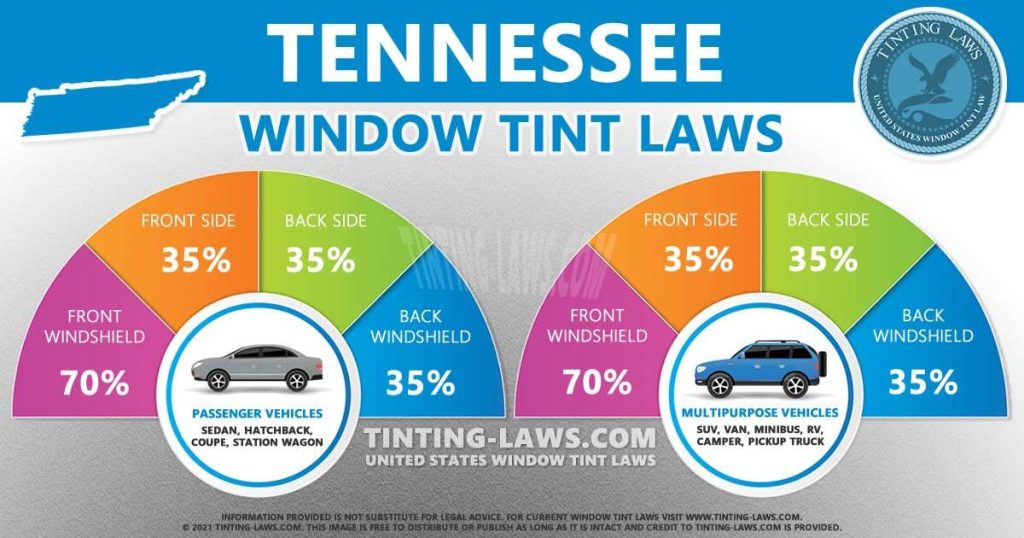Tennessee Window Tinting Laws
Tennessee window tint laws permit 70% VLT on windshields.
All other windows may have 35% VLT (must allow more than 35% of light in). These tinting laws are valid for all vehicle types.
Car window tinting laws in Tennessee were enacted in 1990.
We have provided all the necessary information about your car’s window tint, including how dark or reflective the tint is allowed in your state.
There are also additional car window tinting rules and regulations in Tennessee so make sure you read all about it below.
Window tint darkness in Tennessee
The percent of visible light allowed through your car windows is called VLT: Visible Light Transmission.
The percentage of light allowed through your film and glass in Tennessee is very specific and different for sedan cars and SUV cars or vans.
Tint darkness for sedans:
- Windshield: Must allow more than 70% of light in; any darkness on AS-1 line.
- Front Side windows: Must allow more than 35% of light in.
- Back Side windows: Must allow more than 35% of light in.
- Rear Window: Must allow more than 35% of light in.
Tint darkness for SUV and vans:
- Windshield: Must allow more than 70% of light in; any darkness on AS-1 line.
- Front Side windows: Must allow more than 35% of light in.
- Back Side windows: Must allow more than 35% of light in.
- Rear Window: Must allow more than 35% of light in.
Window tint reflection in Tennessee
Window tint can reflect incoming light and reduce glare and heat.
Tennessee window tint law permits a certain window reflection when using a tint so make sure you pay attention to this as well.
Tint reflection for sedans:
- Front Side windows: No mirrored or metallic appearance.
- Back Side windows: No mirrored or metallic appearance.
Tint reflection for SUV and vans:
- Front Side windows: No mirrored or metallic appearance.
- Back Side windows: No mirrored or metallic appearance.
Other Tennessee window tint rules and regulations:
Tennessee does have several other important laws, rules and regulations pertaining to window tinting. They include the following:
- Side Mirrors: No restrictions on side mirrors.
- Restricted Colors: No colors of tint are explicitly restricted.
- Certificates: Film manufacturers are not required to certify the film they sell in Tennessee.
- Stickers: The sticker to identify legal tinting is required between the film & glass on the driver’s side window.
- Medical Exceptions: Tennessee law allows medical exemptions for special tint. For more details about the specific terms of the exemption, consult your state law.
Keep in mind that Tennessee tinting laws and regulations may be interpreted differently in your county or place of residence.
We always recommend double-checking our information with your local DMV or law enforcement authorities.

Our information about window tint laws in Tennessee was last updated in 2024.
Tinting laws in Tennessee were enacted in 1990.
In case any of our info provided is not up to date or correct be sure to contact us so we can fix it. Thanks!
Trusted industry leader in providing accurate window tint laws. Share with confidence:
State of Tennessee Info
Tennessee is a U.S. state located in the South-eastern United States, and it’s the 36th most extensive and the 17th most populous of the 50 United States.
Tennessee is bordered by Kentucky and Virginia to the north, North Carolina to the east, Georgia, Alabama, and Mississippi to the south, and Arkansas and Missouri to the west.

The Appalachian Mountains dominate the eastern part of the state, and the Mississippi River forms the state’s western border.
Tennessee’s capital and second largest city is Nashville, which has a population of 609,644. Memphis is the state’s largest city, with a population of 652,050.
Capital: Nashville
Population: 6,975,218
Area: 42,143 sq mi (109,247 km2)
Cities in Tennessee: Nashville, Memphis, Chattanooga, Knoxville, Gatlinburg, Murfreesboro, Pigeon Forge, Clarksville, Johnson City, Franklin, Kingsport, Oak Ridge, Sevierville, Cookeville, Maryville, Hendersonville, Brentwood, Jackson, Germantown, Crossville, Mt. Juliet, Cleveland, Greeneville, Bristol, Collierville, Morristown, Lebanon, Smyrna, Gallatin, Manchester, Spring Hill, Columbia, Lynchburg, Goodlettsville, Jonesborough, Bartlett, Elizabethton, Tullahoma, McMinnville, Sewanee, Dyersburg, La Vergne, Athens, Shelbyville, Cordova, Paris, Millington, Antioch, Townsend, Alcoa
Counties in Tennessee: Anderson, Bedford, Benton, Bledsoe, Blount, Bradley, Campbell, Cannon, Carroll, Carter, Cheatham, Chester, Claiborne, Clay, Cocke, Coffee, Crockett, Cumberland, Davidson, Decatur, DeKalb, Dickson, Dyer,Fayette, Fentress, Franklin, Gibson, Giles, Grainger, Greene, Grundy, Hamblen, Hamilton, Hancock, Hardeman, Hardin, Hawkins, Haywood, Henderson, Henry, Hickman, Houston, Humphreys, Jackson, James, Jefferson, Johnson, Knox, Lake, Lauderdale, Lawrence, Lewis, Lincoln, Loudon, Macon, Madison, Marion, Marshall, Maury, McMinn, McNairy, Meigs, Monroe, Montgomery, Moore, Morgan, Obion, Overton, Perry, Pickett, Polk, Putnam, Rhea, Roane, Robertson, Rutherford, Scott, Sequatchie, Sevier, Shelby, Smith, State Level Sites, Stewart, Sullivan, Sumner, Tipton, Trousdale, Unicoi, Union, Van Buren, Warren, Washington, Wayne, Weakley, White, Williamson, Wilson
Tint law references:
Tennessee law Title 55 Chapter 9 Part 1 (search for “windows with tinting”)